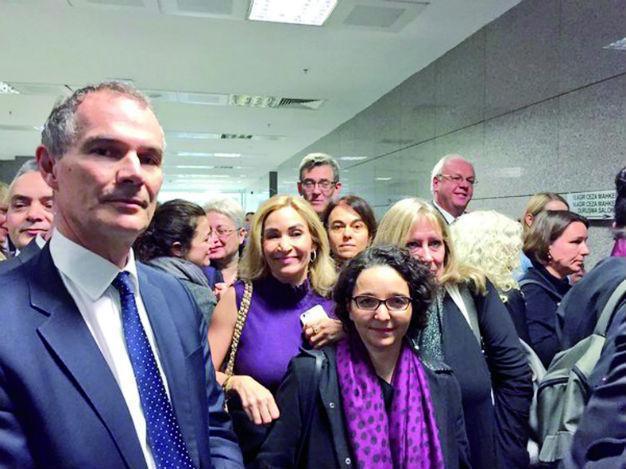Turkey sends diplomatic note over foreign envoys attending journalists’ trial
ANKARA

Turkey has sent a diplomatic note to the embassies of the eight consuls general who attended the controversial trial of Cumhuriyet editor-in-chief Can Dündar and Ankara bureau chief Erdem Gül, while the presidential spokesman and justice minister slammed the diplomats for intervening in Turkey’s domestic affairs and judicial processes.
Foreign Ministry officials said the sharing on social media of photos at the trial by some diplomatic and consular representatives amounted to an intervention in an ongoing independent judicial process and is incompatible with the principle of impartiality. They said Turkey’s disturbance over the issue had been sent to the related country representatives, Reuters reported.
The announcement came after leading political figures including Presidential Spokesman İbrahim Kalın, Justice Minister Bekir Bozdağ, and President Recep Tayyip Erdoğan slammed consul generals from various countries as well as main opposition Republican People’s Party (CHP) and the Peoples’ Democratic Party (HDP) deputies for attending the first hearing of the case on March 25 to show solidarity with Dündar and Gül, who were released Feb. 26 upon a Constitutional Court decision after 92 days in jail.
Diplomats from several countries including Germany, the United Kingdom, France, the Netherlands, Switzerland, Canada, Italy and Poland attended the hearing where U.K. Consul-General in Istanbul Leigh Turner shared images from outside the courtroom and messages of support for the journalists on his official Twitter account.
Kalın on March 28 criticized the consuls general, urging them to refrain from projecting an image of intervening in domestic affairs or the judicial process.
Turkish Justice Minister Bekir Bozdağ also lashed out at opposition party deputies and foreign diplomats for “interfering” with the legal processes.
Bozdağ wrote on his official Twitter account March 28 that the interference by deputies from the CHP and the HDP with the duty of the Istanbul 14th Court of Serious Crimes, which is trying Dündar and Gül, was a “crime against the judgement as well as the crime of influencing and preventing those conducting the judicial process.”
“Making verbal or written statements to create an illegal influence on person who conducts their judicial duty or who implements order in order to make him/her give a decision against the law is a crime,” the Justice Minister said.
“Using force and threats to prevent a person from conducting their judicial duty is also a crime. Interference by CHP and HDP deputies with the duty of the Istanbul 14th Court of Serious Crimes is a crime of influencing judgement and a person who conducts judgement, as well as preventing the judicial duty of that person,” he said, adding that the legal decisions could be “criticized but nobody including the CHP and HDP deputies could put pressure on the courts and those conducting legal duty.”
“No office, body, authority or person can give an order or instruction to the courts or to the judges, nor could they give advice or suggestions. No inquiries, no meeting and no statement could be made in parliament about the function of the jurisdiction on pending cases,” Bozdağ said, as he also criticized the consul generals of foreign countries, saying their “overstepping of limits and trying to influence the Turkish judicial system by acting together is not acceptable.”
On March 26, President Recep Tayyip Erdoğan had also severely criticized the aforementioned diplomats.
“Yesterday [March 25] there was a hearing of a known journalist. The situation of those who attended this hearing is very important. The consuls general in Istanbul come to the courthouse. Who are you, what are you doing there?” Erdoğan said.
Erdoğan once again hit out at diplomats March 28.
Dündar and Gül, who were released pending trial on Feb. 26 after a decision by the Constitutional Court, are charged with espionage and threatening state security in stories published in Cumhuriyet about National Intelligence Agency (MİT) trucks allegedly transporting weapons to rebel groups in Syria.
The court said the journalists’ 92-day imprisonment over charges of terrorism was a “violation of rights.”
The court on March 25 accepted the president and Turkey’s intelligence agency as civil plaintiffs in the case.
Within two hours of the start of the proceedings the judge ordered the trial to be held behind closed doors, granting a request by the prosecution which cited “national security” concerns.
 Turkey has sent a diplomatic note to the embassies of the eight consuls general who attended the controversial trial of Cumhuriyet editor-in-chief Can Dündar and Ankara bureau chief Erdem Gül, while the presidential spokesman and justice minister slammed the diplomats for intervening in Turkey’s domestic affairs and judicial processes.
Turkey has sent a diplomatic note to the embassies of the eight consuls general who attended the controversial trial of Cumhuriyet editor-in-chief Can Dündar and Ankara bureau chief Erdem Gül, while the presidential spokesman and justice minister slammed the diplomats for intervening in Turkey’s domestic affairs and judicial processes.